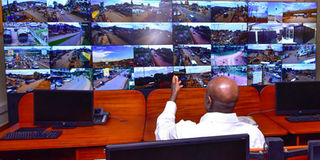Integrate citizens’ data to CCTV camera system

President Museveni yesterday inspected a Closed-Circuit Television (CCTV) camera command centre in Nateete, a Kampala suburb, to see first-hand how the system works. PHOTO BY ABUBAKER LUBOWA
What you need to know:
The issue: CCTV cameras
Our view: The government must quickly integrate into the CCTV system citizens’ and visitors’ data currently held disparately by its agencies.
President Museveni yesterday inspected a Closed-Circuit Television (CCTV) camera command centre in Nateete, a Kampala suburb, to see first-hand how the system works.
He and journalists were shown real-time images captured in different parts of the capital. The motley videos and photographs were beamed on large screens.
The operators, who are IT professionals serving in Uganda Police Force, demonstrated that images captured as far as five kilometres away, could be zoomed in to examine granular details.
For example, the magnification can enable clear identification of front-seat occupants in a vehicle kilometres away -- replete with activity ongoing inside and even specifics such as colour of attire.
When the cameras zoomed in on a random vehicle, the man driving it could be seen at the CCTV monitoring centre talking on phone with a female in the co-driver’s seat.
The President walked away satisfied that one of the 10 solutions he proposed to tackle rising urban crime - installing cameras on town roads and along highways - is finally taking shape after an inordinate delay.
“I was watching from one place people who were eating, people who were doing things they shouldn’t be doing,” he later told the national 56th Independence anniversary fête.
We welcome this key infrastructure development because the sophistication adds a layer of unbiased automated monitoring. It also builds police capacity to detect and coordinate response to trouble spots with speed. This will help security forces and intelligence agencies to fast-track the identification, tracking and arrest of brigands.
The camera system, for instance, has capacity to identify and alert about abandoned luggage, bags or sudden crowding at a location. It can spot and auto-enter registration numbers of vehicles whose drivers break traffic rules, resulting in programmed booking and penalty.
The planned installation of the 5,300 CCTV cameras across the country is estimated to cost Shs460 billion. And 3,300 of the cameras will be installed in Kampala alone.
We offer that to maximise the extras of this investment, the government must quickly integrate into the CCTV system citizens’ and visitors’ data currently held disparately by its agencies. Such includes information, say, on residence, business, work place and property ownership that applicants provide while obtaining national identity cards and passports or during business registration.
Pooling this information will aid authorities to sieve dubious characters, follow wealth for rightful tax liability and discourage criminal. It is our position that the line minister issues a statutory instrument to specifically guard against the abuse of this information in state possession by imposing tougher penalties for misuse.
A crime-free country benefits us all, in and outside government.




